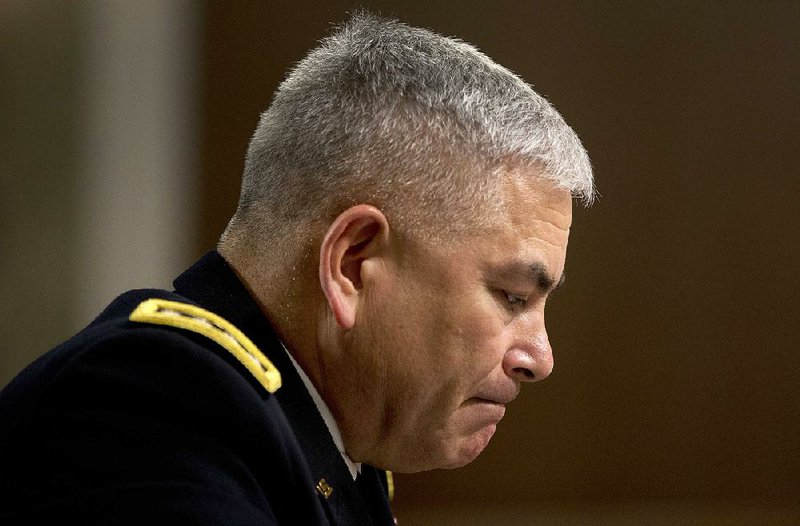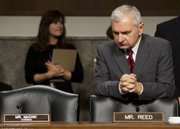WASHINGTON -- The top U.S. commander in Afghanistan recommended on Tuesday that President Barack Obama revise his plan and keep more than 1,000 U.S. troops in the country beyond 2016, just days after a deadly U.S. airstrike "mistakenly struck" a hospital during fierce fighting in the north.
U.S. officials familiar with Gen. John Campbell's thinking said he believes that U.S. troops who called in the strike did not follow rules that allow for the use of air power only in dire situations.
Campbell told Congress that conditions on the ground have changed since Obama announced his plan in 2014 to cut the current U.S. force of 9,800 to an embassy-based security contingent of about 1,000 in Kabul past 2016. Obama has vowed to a war-weary nation to end the U.S. war in Afghanistan and get American troops out by the time he leaves office in January 2017.
Campbell said, however, that Afghanistan remains engaged in a violent battle against the Taliban; military operations in Pakistan have pushed fighters, including those linked to al-Qaida, into eastern and northern Afghanistan; and the emergence of Islamic State fighters has further complicated the conflict.
Campbell, the top commander of U.S. and allied forces in Afghanistan, said that dropping to 1,000 troops would leave the United States with limited ability to train and assist the Afghan forces and even less capacity to conduct counterterrorism operations. He said the different options he has provided to his superiors are for troop levels beyond a normal embassy presence of about 1,000.
Campbell said he believed that the situation in Afghanistan necessitated a change in plans. "I do believe we have to provide our senior leadership with options different from the current plan," he said in a response to a question about whether the drawdown should proceed as planned.
"As I take a look at conditions on the ground," he continued, "when the president made that decision it did not take into account the changes over the past two years."
Campbell refused to discuss the numbers of troops he is recommending. But when Sen. Angus King, I-Maine, asked Campbell if he thought the president should revise his troop withdrawal plan, Campbell replied: "I will stomp my foot. Yes, sir."
Defense Secretary Ashton Carter and Secretary of State John Kerry both have stressed the importance of continuing counterterrorism missions in Afghanistan, even into 2017.
White House spokesman Josh Earnest said the future U.S. troop presence in Afghanistan would be determined by a variety of factors, including conditions inside Afghanistan, remaining threats and what resources the U.S. can provide. He said Obama would consider input from his diplomatic and intelligence advisers, along with the views of the civilian leadership at the Pentagon and NATO allies.
rules of engagement
In private discussions with officials in Washington, Campbell has expressed his belief that the decision by special operations forces operating "in the vicinity" of the Afghan troops in Kunduz likely did not meet criteria for the authorization of airstrikes, according to officials who spoke on condition of anonymity because they were not authorized to discuss the attack.
Under military rules, airstrikes can be authorized to kill terrorist suspects, to protect U.S. troops, and in response to requests for help from the Afghan army in battles that could significantly alter the military landscape in Afghanistan -- such as the recent Taliban takeover of Kunduz -- but not necessarily smaller firefights. The idea behind the rules of engagement was to give U.S. troops leeway but not see them dragged back into daily, open-ended combat.
In his opening remarks to the Senate Armed Services Committee, Campbell offered details about the airstrike on a medical clinic run by Doctors Without Borders. He said a U.S. special operations unit that was close by was communicating with the aircraft that delivered the strike, which killed at least 22 people.
"To be clear, the decision to provide [airstrikes] was a U.S. decision, made within the U.S. chain of command," Campbell said. "The hospital was mistakenly struck. We would never intentionally target a protected medical facility."
The special operations forces apparently did not have "eyes on" -- that is, were not able to positively identify -- the area to be attacked to confirm it was a legitimate target before calling in the strike, the officials said.
"Obviously, the investigation is still underway, but Campbell's thinking now is that the Americans on the ground did not follow the rules of engagement fully," said one of three U.S. officials, who all emphasized that no final conclusions have been reached and that the inquiry could yield different reasons for what transpired.
If U.S. troops did not follow the rules, it is not clear why, or how far up the chain of command, the decision to allow the strike was made. Nor is it clear whether any of the Afghan or U.S. troops involved in the strike knew that they were unleashing a sustained air attack on a hospital.
Campbell said he is requiring that every U.S. service member in Afghanistan be retrained on the circumstances in which U.S. air power can be used.
"To prevent any future incidences of this nature, I've directed the entire force to undergo in-depth training in order to review all of our operational authorities and rules of engagement," he said.
Campbell said a full accounting of the attack would be available after a Pentagon investigation. He declined to give a timeline for that investigation.
His testimony did little to quell the questions over how U.S. commanders responsible for vetting targets could have failed to identify the hospital, a well-known facility in the provincial capital. Officials with the aid group have said they provided the GPS coordinates of the hospital to the U.S. military before and during the attack.
Carter issued a statement promising a full and transparent investigation. "We will do everything we can to understand this tragic incident, learn from it and hold people accountable as necessary," he said.
The Pentagon, NATO and the Afghan government are conducting separate investigations of one of the worst U.S. attacks involving civilian casualties since the war began 14 years ago.
Campbell said more senior officials would have to decide whether to cooperate with an outside investigation.
U.S. warplanes and ground forces, including an undisclosed number of special operations troops, have been assisting Afghan forces trying to retake Kunduz since it fell to the Taliban on Sept. 28, the militant group's first capture of a major urban center since the U.S.-led invasion in 2001. The fighting in the city of 300,000 continued Tuesday, illustrating the resiliency of Taliban insurgents.
Campbell said Brig. Gen. Richard Kim, whom Campbell has ordered to investigate the hospital attack, was in Kunduz on Tuesday and was seeking to interview survivors, including staff members of Doctor Without Borders.
The medical charity, which has closed the hospital and withdrawn from Kunduz, continued its blistering criticism of the U.S. military Tuesday.
Before the general's testimony, Doctors Without Borders put out a statement reiterating its allegations that the destruction of the hospital amounted to a war crime, and repeating its call for an independent investigation.
"This attack cannot be brushed aside as a mere mistake or an inevitable consequence of war," Dr. Joanne Liu, the president of Doctors Without Borders International, said in the statement.
"Nothing can excuse violence against patients, medical workers and health facilities," Liu said. "Under international humanitarian law, hospitals in conflict zones are protected spaces. Until proven otherwise, the events of last Saturday amount to an inexcusable violation of this law."
Campbell has said the aircraft that carried out the weekend attack was an AC-130 gunship. Unlike jets, the AC-130 is dedicated almost entirely to supporting special operations forces.
While most jets streak across a target, moving quickly while dropping bombs or firing cannons or machine guns, the AC-130 essentially hovers over a target about 7,000 feet up, flying in a circle and firing from weapons ports mounted on its left side.
Unlike other military fixed-wing aircraft, an AC-130 is requested differently. While a jet requires a map coordinate to engage its target, the AC-130 relies on direction [a compass heading] and a distance to the enemy target from the friendly forces engaged on the ground. In short, it relies on visual targeting.
This difference might explain why the hospital was targeted even though Doctors Without Borders said it had given U.S. and Afghan forces its map coordinates before.
sexual abuse
At Tuesday's hearing, lawmakers also questioned Campbell about reports that Afghan troops who have worked with U.S. military personnel have sexually assaulted boys and that U.S. troops were told to ignore suspicions of abuse.
"I have required that within 30 days all personnel in theater complete additional training on human-rights abuse reporting requirements," Campbell said. "What our policy has said since 2011 is that you have to report instances of sexual abuse by the Afghan security forces up the chain of command."
Rep. Mac Thornberry, R-Texas, and chairman of the House Armed Services Committee, spoke by phone Tuesday with Army Secretary John McHugh urging him to delay the discharge of Sgt. 1st Class Charles Martland for assaulting an Afghan police officer accused of sexually assaulting a young boy in 2011. Thornberry said he noted "potential procedural errors in due process" while reviewing Martland's case and suggested he be allowed to stay in the Army long enough to prepare an appeal.
Information for this article was contributed by Deb Riechmann and Robert Burns of The Associated Press; by Eric Schmitt and Matthew Rosenberg of The New York Times; by David S. Cloud, Shashank Bengali and Ali Latifi of Tribune News Service; and by Missy Ryan, Thomas Gibbons-Neff and Tim Craig of The Washington Post.
A Section on 10/07/2015

